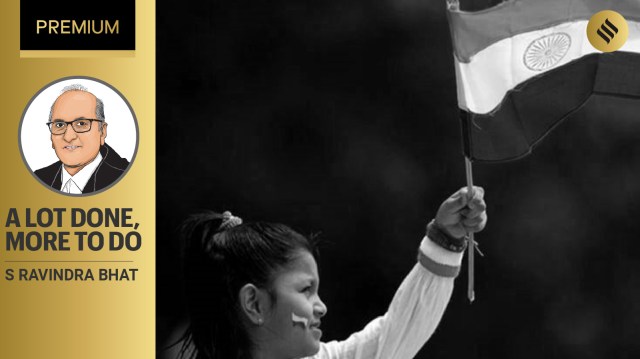
Emerging from colonial rule, India that is Bharat saw its people transform into empowered citizens, putting together its Constitution, a full-fledged democracy with universal adult franchise. This bold assertion of the nation’s democratic identity was in the wake of unparallelled sectarian violence. Thus, did we “step out from the old to new” with hopes in our hearts, and a resolve to succeed. Many were the prophets who predicted the quick collapse of our carefully drafted Constitution — a finely balanced system of governance, democratic freedoms to its citizens, a guarantee of equality in form and substance, assurance of dignity and fraternity to everyone, and universal adult suffrage, at a time when western nations did not provide such guarantees of equal participation or universal suffrage. The Constitution also held out the promise of social justice, of distribution of material resources for the good of the greatest number. Our birthright, our swaraj, was not only independence from the external ruler, but also the resolve to economically and socially emancipate our citizens.
At this 75th anniversary of our republic, there is much to celebrate. From 32 years, the average life expectancy of citizens is now 75 years. India has become one of the largest producers of foodgrains. Literacy rate has increased from 12 per cent to 75 per cent. In power generation, road and infrastructure development, we have made major strides. In size, our nation has the fifth largest economy globally. Our forays into space have shown spectacular success, with the soft landing of Chandrayaan-3’s Vikram. Our election system and polity have shown a stability that stands in stark contrast with our neighbours, and even puts older democracies to shame.
The Constitution guarantees dignity, justice (including social and economic) and fraternity, besides liberty. This guarantee of dignity and fraternity constitutes the essence of our basic rights, where individuals are bound to value each other’s worth. This places greater responsibility on the state to ensure that each policy and law achieves the objective of meaningful access to education, public health, employment and a basic standard of living assuring self-worth and dignity to each citizen.
Assuring dignity involves going beyond providing basic human needs. It entails a commitment by the state and society to ensure what we have not achieved — the complete elimination of caste discrimination and caste stigmatisation involving performance of tasks such as manual scavenging by a section of the weakest, most vulnerable section of people. True dignity and fraternity means the practice of an attitude which we have not yet displayed: That every human being is capable of doing everything; that the poorest and the weakest are equal in worth and as secure with full rights as citizens as any other.
The legal world, which I have been a part of, needs to be reimagined. There is much to be desired in terms of realising the goal of quick and inexpensive justice. The oft repeated refrain is that the legal system is inordinately slow. To the user, yes, that is true. But that fact alone should not obscure the crying need to address infrastructural and manpower issues that plague the courts.
For an estimated population of 1.4 billion or 140 crore people, the sanctioned strength of judges overall is just 25,081. There are a significant number of vacancies at any given time and for the available judges, there are a little over 20,000 court rooms. The case-loads which most judges are expected to handle is crushing and perhaps the world’s largest: It could range from 60 to 150 cases each day. Most judges have little time to reflect, and their day is spent on managing the cases, getting on with trials and long hearings, poring over masses of documents, and finally even after court hours, spending long hours, analysing facts, the law, and writing judgments.
There is an urgent need to develop long term plans to address the systemic challenges of the court system, be it infrastructure, identification of causes for case arrears, optimal caseload of judges. The legal system needs to evolve, and ensure quick, affordable justice delivery: Reforms in procedure and processes require cooperation with other wings of governance; an ongoing public dialogue, for achieving the goal of access to speedy justice.
India is currently experiencing its own digital revolution impacting everyday life — from petty transactions or access to banking facilities, to online retail marketplaces and access to education. What has undoubtedly propelled the nation in terms of progress, also carries with it the perils of exclusion — exacerbated by geographical limitations, limited individual spending capacities, and low levels of digital literacy. This “digital divide” has rendered millions vulnerable, with regards to their rights, entitlements and access to essential services.
Lastly, efforts towards mitigating the disastrous impact of climate change on our geographically diverse and vast territory is the need of the hour. Experiencing an intensely warming climate, changing rainfall patterns, causing both droughts and flooding in equal measure across India, we face an imminent struggle that continues to adversely affect the state of public health, agriculture, nutrition, and public safety, the devastating impact of which will continue to be disproportionately felt by the marginalised.
Prosperity and well-being cannot be measured by gross national wealth, but the net feeling of well-being of each individual. Existing barriers, “narrow domestic walls”, have to go. The challenge is how swiftly we as a nation can achieve equality, and justice — social, economic and political, assuring dignity of each individual.
The writer is a retired judge of the Supreme Court